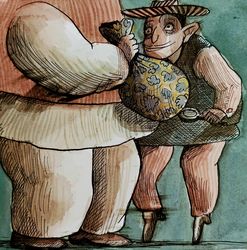The Election Commission is proud of how its expenditure observers and flying squads are preventing parties and candidates from distributing cash, liquor and gifts during the current elections. Punjab’s chief electoral officer announced that drugs worth Rs200 crore, liquor worth Rs12 crore and Rs18 crore in cash have been seized. In other states, claims are being made by both the police and election officials regarding seizures from offices, homes and vehicles.
The haul would only increase as polling dates come closer in the five election-bound states. So far, there has been no seizure of other gifts, though enthusiasts belonging to different parties have announced that lakhs of saris and shirts embossed with party symbols and images of leaders are ready. In Gujarat, where assembly polls are due next year, a sari-maker wants to get political customers from Uttar Pradesh, Punjab and Uttarakhand.
T.S. Krishnamurthy, the first Indian Revenue Service officer to become chief election commissioner, had actively stressed the need for having observers to monitor election expenditure. He had also promoted the practice of appointing IAS officers from other regions as general observers reporting directly to the commission in poll-bound states. The present CEC, Sushil Chandra, is also from the IRS background; other chiefs in the past three decades have mainly been from the IAS.
For officials who are drafted from different regions in the country, it is an exciting experience to act on tip-offs and carry out raids when the model code of conduct is in place. Last year, when Assam, Kerala, Puducherry, Tamil Nadu and West Bengal went to the polls, the seizures were valued at more than Rs2,000 crore—up from Rs225 crore five years earlier. During the 2019 Lok Sabha polls, which were swept by the BJP, the seizures totalled Rs3,500 crore. Central agencies, including the CBI, the Enforcement Directorate and the Narcotics Control Bureau, have been told to focus on the hoarding of money and distribution of drugs, but opposition parties have accused them of being the BJP’s handmaidens.
Activists who work hard on ensuring clean elections are frustrated that these claims of big seizures remain just claims. In most cases, the police or the district treasury are forced to return the seized money, as the accused are able to furnish evidence regarding the source of funds and the intended use. Though the model code of conduct says that anyone who carries above Rs50,000 has to explain the source of money, the claims are easy to establish. Invariably, they are meant for business transactions, especially for purchasing property. Even though the income tax department issues a notice for possessing large amounts of cash, the accused can secure the money if they can furnish a reasonable explanation. Further, prosecution becomes difficult because officials on deputation for the election period would not be available either to complete the investigation or help the investigators in court. When activists approach the Election Commission for knowing the status of the prosecutions, they are referred to the police or Central agencies, as the EC does not have its own teams for monitoring the case.
Even in the case of liquor, ingenious claims are made to prove ownership. Seized gifts like sewing machines, pressure cookers and saris are often reclaimed by producing bills from agents. In some cases, though, they rot away in government godowns.
There are questions whether candidates and parties actually distribute drugs as an inducement, and whether drug seizures are from the usual trade and distribution channels. What seems clear is that the EC now has to seriously work out ways to ensure that seizures made during poll campaigns help in convicting corrupt players.
sachi@theweek.in


